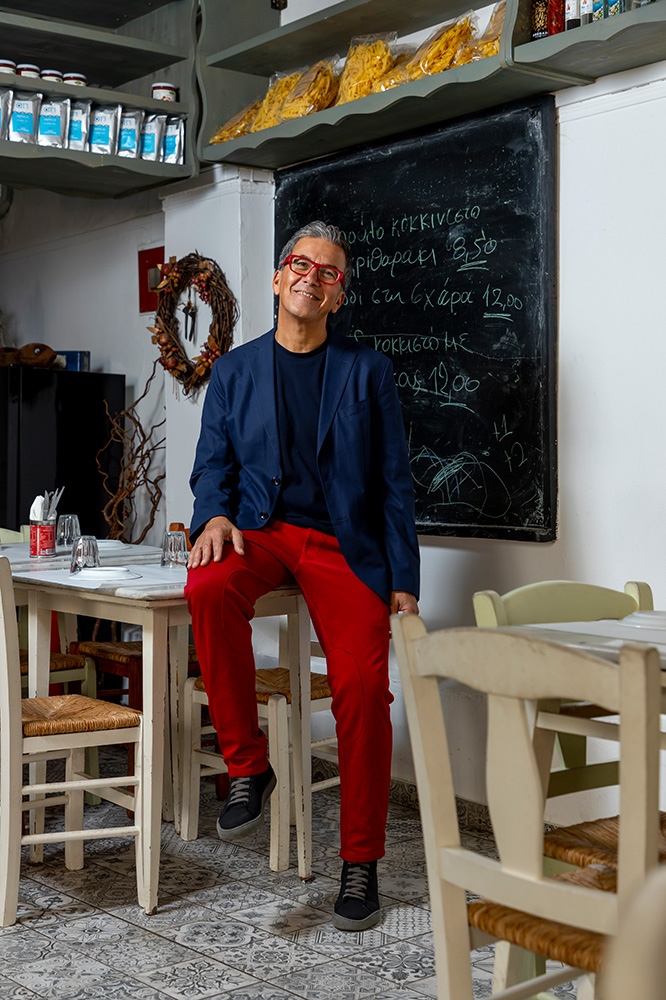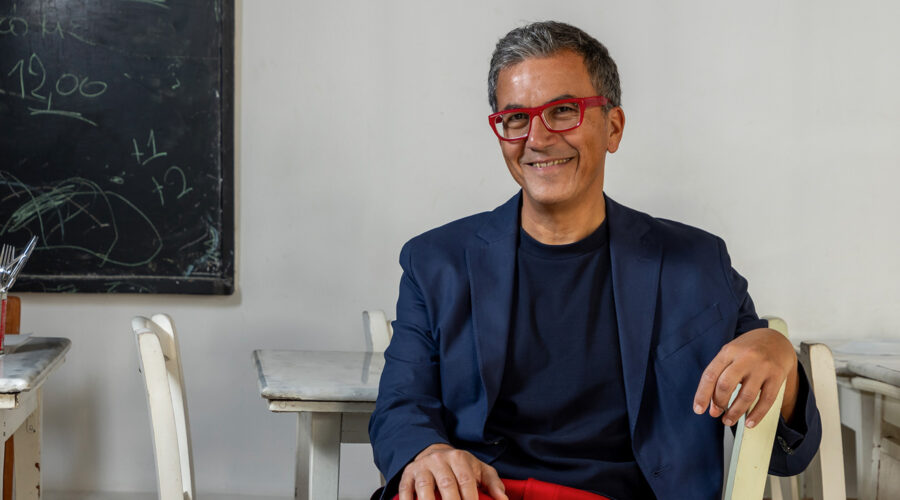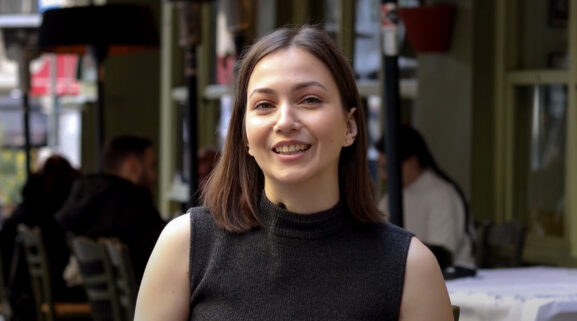Kostis Zafirakis, The Journalist
A man with life running strong in his veins could not profess to be a stranger to retsina and wine in general – to the catalyst, that is, which frees us from our shyness and fears, helping our true selves to surface a little more unshaven. Not that Kostis Zafeirakis was ever afraid to share his truth with everyone – friends and foes alike. Retsina, however, gave him causeand reason for many, really nice life stories.
"The ethnography of the retsina - as I remember it from the 1980s and 1990s and as it has been captured in all the 'black and white' songs and films - refers to the immortal Greek summer".
FROM GERAKINI TO REMBETADIKA.
Kostis Zafeirakis is an exuberant man – abundant in everything: in emotions, experiences, joy, and sadness, in free time and at work. A passionate man, who does not hesitate for a moment to share his own truth with you, to open a wide window into his life and his past, his present and what he wishes his future to be. A man who is caught by every touch, taste, smell, image, sound, to enjoy the now to the last drop and with his five senses. Would it ever be possible for such a man (who also happens to be a Thessalonican) to not have his own retsina life stories?
"I'm not a heavy drinker - quite the opposite, in fact," he confesses. "Neither beers nor retsina nor tsikoudies. In the tsipouradikaand in the taverns and the bars, I am the most popular of the group, the 'foreigner' of alcohol. The first memory that comes to me related to retsina is my mother's imperial dinners in Gerakini, on the kitchen balcony - friends, sweet drinks, and songs. Dad likedretsina, always frozen. Roula's appetizers – sometimes for retsina and sometimes for tsipouro – are a fascinating narrative. We also experienced the times when the slogan 'Retsina Kurtaki, every day is a celebration' dominated, especially during our summer vacations in Halkidiki. Dad, an amateur fisherman, was returning from the sea with a bucket full of sparrows, mullets, and carp. There were always retsina in the fridge, for the pleasures at lunchtime, after the bath. Or for the evening feasts, which usually started with retsina or tsipouro. My sister, Melina, always more of a geek than me, drank secretly... Until one day – we must have been in our early teens – she downed a bottle of retsina by herself and was completely knocked out, it took her days to recover".
So, the family loved retsina. Kostis himself? "I didn't like the taste of retsina, but I'm also very innocent and irrelevant in such matters..." he tells us, laughing. “Even on our student diversions, I was everyone's safety, the prudent driver who would return them all safe and sound to their homes. This is still true. But I also have somecrazy drunkennessesin my resume – I'm not an alien either –, mostly with raki or wine. Even when I was totally penniless, I was never tempted to take retsina from the kiosk or the supermarket, not even‘for the sake of appearances', as they say, for 'honor'... And on our night walks, on the beach until at dawn or at rebetadika, I got drunk and still get drunk with a 'mechanism' of my own... Maybe I have some alcoholic enzyme in my body, which is activated automatically when the circumstances call for it, I don't know. Once I also tried the famous 'Tumba Libre' - PAOK friends gave it to me and insisted, I remember, that I like it, but I didn't... But alwaysretsina, as a symbol, brings me all these emotions and memories, when we were walking around the night Tsimiski street, singing Tsitsanis. Or when we swam at night and then gazed at the stars until dawn, chatting about love and other mysteries. Fortunately, with or without alcohol, we still keep these habits alive with my people".

THE AUTHENTIC GREECE.
"Retsina is one of the most authentic Greek wines, made with vines, retsini and the Greek sun", we explain to Kostis. He needs no further introduction, though... He's got an image – maybe even better than ours.
"For decades, retsina has been the symbol of an authentic Greece, which now seems old and distant, but brings out a lot of emotion", he explains. "The ethnography of retsina - as I remember it from the 1980s and 1990s and as it has been captured in the 'black and white' songs and films - refers to the immortal Greek summer, with the mousaka protagonist, the tzatziki and the souvlaki and, of course, the high jinksin the popular neighborhoods, when breaking dishes was part of the ritual on top of high spirits– housewives mourned their crockery, Vougiouklaki and Bithikotsis sang 'Be patient and the sky will become bluer' and Alexis Zorbas danced his drunken steps. Images that have been captured in a thousand and two photographs and in literature... There is a shocking text by Varnalis about Papadiamantis, written in 1937: 'Ah, then, if they were sitting at the table, Mr. Stefanos, who distinguished his friend's habits, was filling him a mug of retsina. Mr. Alexandros would grab it with both his hands (because his hands were shaking) and empty it completely with a touching longing. Then, his blood would wake up and flow warm in his veins, his eyes would clear, his soul would open its folded wings and only then would the eating begin. 'It was a nice retsina' (he says in one of his short stories) 'all perfume and flight and foam'! What a lyrical passion, what a true love for wine!''
IT KEPT FOR YEARS...
"For about 4,000 years, retsina has been the Greek's companion in hardships and pleasures", continues the well-known journalist. "In 'Peri Osmon', the philosopher Theophrastus talks about his beloved retsina, mentioning how suitable the marriage of the two agricultural products, resin and grape, is, even emphasizing that the best resin comes from the pine Pinus Halepensis). Since the 1990s, retsina is losing its glamour, wine is gaining ground, wine tourism and wine connoisseurship are shaping and strengthening our wine culture, times are changing and Greek wine is triumphant – for a time, ordering retsina in gourmet restaurant was considered an almost criminal crime, perhaps still is. I may not be crazy about retsina, but I have to admit its unmistakable Greek character. As a product of another era and another emotional upbringing, it has its stamp. For historical, therefore, ethnographic, culinary and tourist reasons, the conversion observed in recent years in the enjoyment of retsina is of great interest".
OUR RETSINA.
How would a master flâneur, like Kostis Zafirakis, associate Thessaloniki with this characteristic wine?
"First of all, the Thessaloniki invention 'Tuba Libre' has long since broken the borders of the city and the country - at 'The Life Goddess' in London, my friend Nikos Nyfoudis and his family serve the famous 'Tuba Libre', along with the slogan 'I am PAOK, and I will drink Tuba Libre in London'. Thessaloniki, as a refugee city and a student city, rock and rebetissa together, has many historical firsts in its skin and blood. Retsinaof the frenzied and thoughtless student years, retsina of the bohemians and the alternatives, the economically weaker populations, the luben and the fringes which, as history has proven, often mutate into dominant social models, retsina of the summers and the rebetedika, of PAOK, Aris and Iraklis, the genuine folk neighborhoods (from Efkarpia and Evosmos to Toumba and Karabournaki), retsina of fishermen who dry out in Thermaicfor a sea bass, of workers after their daily wages (especially in the neighborhoods around Vardari), of the students who spend the night on the benches of the beach or in the Castles... Retsinaof ideologues, lovers and 'homeless' romantics".
"SAME FOR THE HEART TO COME OUT FORWARD".
And Kostis' retsina and wine? With which of his own moments has he identified them? At what point in his life was wine a consolation in distress, a 'fuel' in joy, a friend and company when he needed it?
"I remember an evening when I was a drunkard, 1990s, African American students in Athens, at a Halloween party with the theme of 'Red Lights'. All dressed as sailors, prostitutes, TzeniKareziand DespoDiamantidou and Giorgos Fountas. I, too, painted crimson like the Red Cross logo, dressed from top to bottom in the red of fire. I was dressed as a 'Red Light'. I was a susceptible population back then – romantically speaking, what else? And having poured it into the wine, I drank all the vineyards of Naoussa in one night. I wandered from room to room, from hug to hug, repeating the same trope, the well-known and sung a thousand times, about love, loneliness and all our eternal complaints... There are also documents, photographs, irrefutable evidence. Kostis on the bedroom floor to cry, in the bathroom to cry, in the living room to drink some more, Kostis in the hugs and kisses, friends and strangers comforted me, danced with me, we laughed and cried, we sang... Meanwhile, I had started to strip and had reddened the clothes of everyone I had hugged, the walls of the house, the floorboards of the bedroom... Another drunk, around 2000, for hours we wandered around the center of Thessaloniki, hugging and kissing everyone, non-stop and indiscriminate... We're talking about normal kisses and hugs, not fakethings. Project normal, cinema. This cursed freedom that we lose growing up, our truth that is buried in the dust, etc., etc., there are times when we find it again – let the wine be good. A little wine - we don't need to become a 'Red Light', just enough to make the mind dizzy and start to falter, the heart to come forward, away from the mundane reality".
Choose the interest you want and discover the route that suits:



